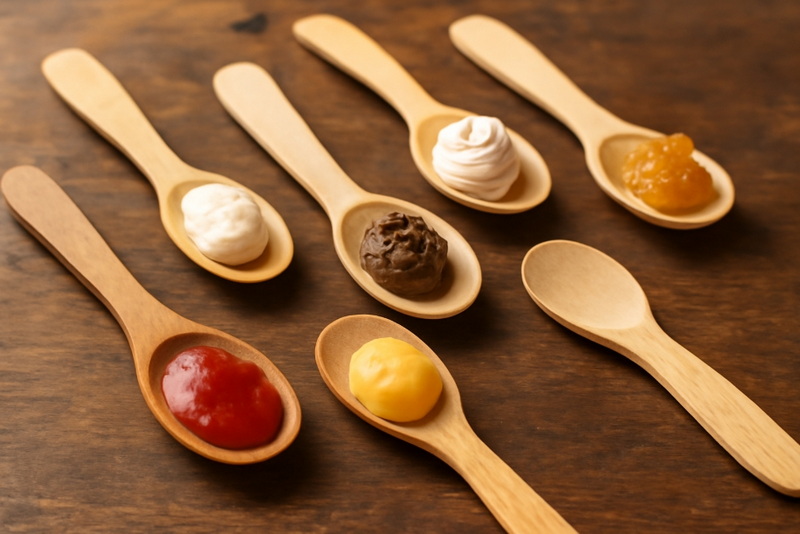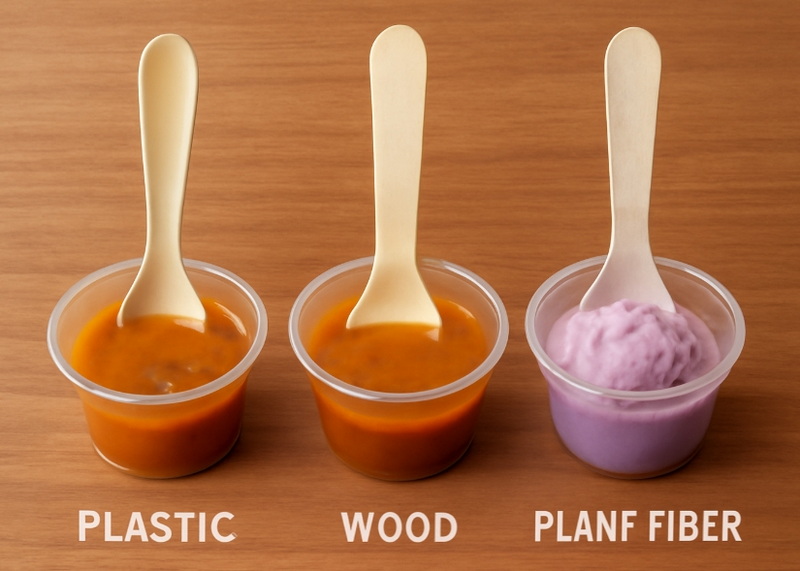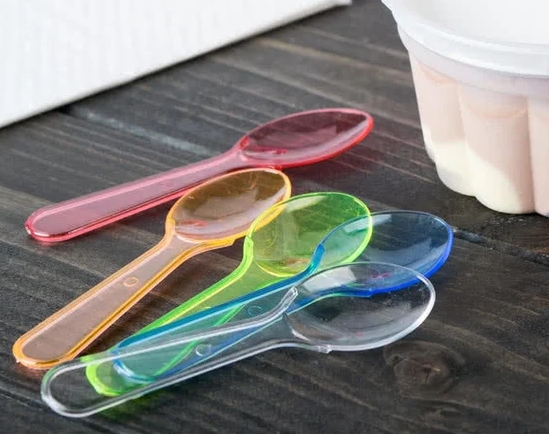
Content Menu
● What Are Tiny Disposable Tasting Spoons?
● Safety of Tiny Disposable Tasting Spoons with Hot Foods
>> Plastic Spoons and Heat Resistance
>> Wooden and Plant Fiber Spoons for Hot Foods
>> Paperboard Spoons and Hot Foods
● Safety of Tiny Disposable Tasting Spoons with Cold Foods
● Environmental and Health Considerations
>> Biodegradable and Compostable Options
>> Chemical Safety
>> Hygiene and Single-Use Benefits
● Practical Tips for Choosing and Using Tiny Disposable Tasting Spoons
● Common Uses for Tiny Disposable Tasting Spoons
● Innovations in Tiny Disposable Tasting Spoon Design
● Addressing Common Concerns
● Conclusion
● FAQ
>> 1. Are tiny disposable tasting spoons safe for hot soups and stews?
>> 2. Can tiny disposable tasting spoons be used with ice cream and frozen desserts?
>> 3. Are wooden tiny disposable tasting spoons biodegradable?
>> 4. What materials are best for eco-friendly tiny disposable tasting spoons?
>> 5. How long can tiny disposable tasting spoons be left in hot or wet foods?
Tiny disposable tasting spoons have become a staple in the culinary world, especially in settings where food sampling, catering, and food service are involved. Their convenience, hygiene, and versatility make them an attractive choice for both professionals and consumers. However, questions often arise regarding their safety when used with hot and cold foods. Are these small utensils truly safe for all types of food? What materials are best suited for different temperatures? This comprehensive guide explores the safety, materials, environmental impact, and best practices for using tiny disposable tasting spoons, ensuring you make the best choice for your needs.

What Are Tiny Disposable Tasting Spoons?
Tiny disposable tasting spoons are small, single-use utensils designed for sampling food and beverages. They are widely used in ice cream shops, supermarkets, food festivals, catering events, and restaurants. Their primary purpose is to provide a hygienic way for customers to taste food without cross-contamination or the need for washing reusable utensils.
These spoons are available in a variety of materials, each with its own benefits and limitations:
- Plastic: The most common material, available in both clear and colored options. Plastic spoons are lightweight, durable, and cost-effective.
- Wood: Made from birch or bamboo, wooden spoons are biodegradable and compostable, appealing to eco-conscious consumers.
- Paperboard: These are made from thick, food-safe paper and are often coated for added strength.
- Plant Fiber: Materials such as bagasse (sugarcane fiber) or bamboo fiber are used to create compostable, sturdy spoons.
The choice of material directly affects the safety and performance of the tiny disposable tasting spoon, especially when exposed to different food temperatures.
Safety of Tiny Disposable Tasting Spoons with Hot Foods
Plastic Spoons and Heat Resistance
Plastic tiny disposable tasting spoons are commonly used for sampling hot foods such as soups, sauces, and stews. However, not all plastics are created equal. Some are designed to withstand higher temperatures, while others may warp, melt, or release unwanted chemicals when exposed to heat.
- High-quality plastic spoons are manufactured to resist cracking and melting at typical serving temperatures for hot foods. These spoons maintain their shape and do not impart any taste or odor to the food.
- Low-grade plastic spoons may soften or deform when placed in hot liquids. In some cases, they may leach chemicals if not specifically designed for food contact at high temperatures.
When selecting a plastic tiny disposable tasting spoon for hot foods, it is crucial to ensure it is labeled as heat-resistant or suitable for hot food service. This information is usually provided by the manufacturer.
Wooden and Plant Fiber Spoons for Hot Foods
Wooden and plant fiber tiny disposable tasting spoons are naturally heat-resistant and do not contain synthetic chemicals. They are an excellent choice for hot food sampling because:
- Wooden spoons remain sturdy and comfortable to hold, even in hot soups or sauces. They do not melt or release harmful substances.
- Plant fiber spoons made from bagasse or bamboo are designed to handle high temperatures. They provide a natural, rustic look and are often preferred for their sustainability and safety.
Both options are free from coatings or additives that could potentially leach into food, making them a safe and environmentally friendly choice for hot food sampling.
Paperboard Spoons and Hot Foods
Paperboard tiny disposable tasting spoons are generally suitable for hot foods, but with some limitations. While they are compostable and eco-friendly, prolonged exposure to hot liquids may cause them to soften or lose their shape. Many paperboard spoons are designed with a special fold or coating to help manage hot foods, but they are best used for quick sampling rather than extended use.
Safety of Tiny Disposable Tasting Spoons with Cold Foods
Tiny disposable tasting spoons excel when used with cold foods such as ice cream, gelato, frozen yogurt, chilled salads, and desserts. Their small size and sturdy construction make them ideal for portion control and hygienic sampling.
- Plastic spoons remain rigid and do not become brittle at low temperatures, making them perfect for frozen treats.
- Wooden and plant fiber spoons are moisture-resistant and maintain their strength, providing a pleasant tasting experience.
- Paperboard spoons perform well with cold foods and offer a smooth texture that many consumers enjoy.
Since cold foods do not pose the same risks of melting or chemical leaching, nearly all types of tiny disposable tasting spoons are safe and effective for these applications.
Environmental and Health Considerations
As environmental awareness grows, the demand for sustainable tiny disposable tasting spoons has increased. Many businesses and consumers are looking for options that minimize waste and reduce the impact on the planet.
Biodegradable and Compostable Options
- Wooden spoons are biodegradable and compostable, breaking down naturally after use. They are often made from sustainably sourced wood and are free from harmful chemicals.
- Plant fiber spoons made from bagasse or bamboo are also compostable and can be disposed of in commercial composting facilities.
- Paperboard spoons are recyclable and compostable, provided they do not have plastic coatings.
Chemical Safety
- No PFAS or harmful additives: Many eco-friendly spoons are manufactured without the use of per- and polyfluoroalkyl substances (PFAS) or other harmful chemicals. This ensures that no unwanted substances are transferred to food during use.
- Certified food-safe materials: Look for spoons that are certified for food contact by recognized organizations. This ensures the materials used are safe for both hot and cold foods.
Hygiene and Single-Use Benefits
Tiny disposable tasting spoons offer significant hygiene benefits, especially in public or high-traffic settings. Since each spoon is used only once, the risk of cross-contamination is minimized. This is particularly important in situations where food allergies, dietary restrictions, or foodborne illnesses are a concern.

Practical Tips for Choosing and Using Tiny Disposable Tasting Spoons
To ensure the safety and satisfaction of your customers or guests, consider the following tips when selecting and using tiny disposable tasting spoons:
- Match the material to the food temperature: Use heat-resistant plastic, wood, or plant fiber spoons for hot foods, and any type for cold foods.
- Check for certifications: Look for spoons that are certified compostable, biodegradable, and food-safe.
- Avoid prolonged exposure: Do not leave spoons in hot or wet foods for extended periods, especially if using paperboard or lower-quality plastics.
- Use hygienic dispensers: Store spoons in covered containers or dispensers to prevent contamination before use.
- Consider the environment: Choose compostable or biodegradable options whenever possible to reduce environmental impact.
- Select the right size and shape: Ensure the spoon is comfortable to hold and has a bowl shape that allows for easy sampling of your food.
Common Uses for Tiny Disposable Tasting Spoons
Tiny disposable tasting spoons are used in a wide range of settings, including:
- Ice cream and frozen yogurt shops: For sampling different flavors.
- Supermarkets and food festivals: For offering samples of soups, salads, sauces, or desserts.
- Catering events and parties: For serving amuse-bouche, appetizers, or small desserts.
- Restaurants: For chef's tastings, palate cleansers, or specialty dishes.
Their versatility, hygiene, and convenience make them an indispensable tool in the food service industry.
Innovations in Tiny Disposable Tasting Spoon Design
As demand for sustainable and safe utensils grows, manufacturers are developing new designs and materials for tiny disposable tasting spoons. Some innovations include:
- Color-coded spoons: To distinguish between different flavors or dietary options.
- Textured handles: For improved grip and comfort.
- Unique bowl shapes: Designed to enhance the tasting experience, especially for complex foods.
- Custom branding: Allowing businesses to print their logo or message on the spoon for marketing purposes.
These innovations not only improve functionality but also enhance the overall customer experience.
Addressing Common Concerns
Despite their many benefits, some concerns persist regarding the use of tiny disposable tasting spoons. Here are a few common issues and how to address them:
- Plastic waste: Opt for biodegradable or compostable options to reduce environmental impact.
- Chemical safety: Choose spoons made from certified food-safe materials and avoid those with added chemicals or coatings.
- Strength and durability: Select spoons designed for the specific temperature and texture of the food being served.
- Cost: While eco-friendly options may be slightly more expensive, the benefits to health and the environment often outweigh the additional cost.
Conclusion
Tiny disposable tasting spoons are a safe and practical solution for sampling both hot and cold foods when chosen with care. By selecting the right material for the intended use, ensuring food safety certifications, and considering environmental impact, food service providers can offer a hygienic and enjoyable tasting experience. Whether you are serving piping hot soups or frozen desserts, there is a tiny disposable tasting spoon perfectly suited to your needs. As the industry evolves, new materials and designs continue to improve the safety, sustainability, and user experience of these essential utensils.

FAQ
1. Are tiny disposable tasting spoons safe for hot soups and stews?
Yes, many tiny disposable tasting spoons made from heat-resistant plastic, wood, or plant fiber are designed to handle hot foods without melting or breaking. Always check the product description to ensure the spoon is suitable for hot food use.
2. Can tiny disposable tasting spoons be used with ice cream and frozen desserts?
Absolutely. Tiny disposable tasting spoons are ideal for sampling cold foods like ice cream, gelato, and frozen yogurt. Materials such as plastic, wood, and plant fiber maintain their strength and do not become brittle at low temperatures.
3. Are wooden tiny disposable tasting spoons biodegradable?
Yes, wooden tiny disposable tasting spoons are biodegradable and compostable. They are made from natural materials and break down easily in composting environments, making them an eco-friendly choice.
4. What materials are best for eco-friendly tiny disposable tasting spoons?
The best eco-friendly options include spoons made from bagasse (sugarcane fiber), bamboo, wood, and paperboard. These materials are compostable, renewable, and often certified by environmental organizations.
5. How long can tiny disposable tasting spoons be left in hot or wet foods?
It is best not to leave tiny disposable tasting spoons in hot or wet foods for long periods, especially if they are made from paperboard or lower-quality plastics. For short tasting sessions, they perform well, but for extended use, choose sturdier materials like heat-resistant plastic, wood, or plant fiber.

















